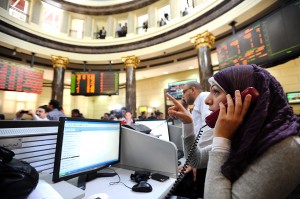
(DNE File Photo)
The Egyptian stock market witnessed a 4.22% plummet in its benchmark index, the EGX-30, dropping from Thursday’s 8242.94 points to 7894.73, and shedding EGP 15.99bn Sunday. Last Thursday, the market loss registered over EGP 12bn.
Small and medium enterprises Index EGX-70 dropped by 4.88% and reached 560.73 points, compared to 589.50 points registered at the end of last week’s trading. The broader EGX-100 also declined by 4.42%, reaching 985.24 pointed compared to 1030.85 points.
As a result of the decrease in the EGX 100 Index, which hit 5% during the session, the Egyptian Exchange announced the suspension of trading for 30 minutes.
A top stock market analyst, who preferred to remain anonymous, said the blame for the losses lies with the recently announced capital gains tax.
Similar taxes may be applied elsewhere, he said, but not in emerging markets.
Deputy CEO at HC Securities and Investment Mahmoud Metwally, however, called the losses an “over-exaggerated reaction by some investors who are trying to lock in their profits before the tax is applied”.
Sunday’s trading day closed with six gainers, 161 declines and 17 unchanged.
“Once the government announces the full details of the tax, which I hope happens very quickly, this drop on the value of share will be an excellent opportunity for the new investors,” said Metwally. “It is [the tax] is very normal to have a capital gain tax on the profits”.
On the timing of the announcement, Metwally said: “There is no perfect timing to announce imposing a tax”.
Metwally stressed that the government should not back down as a result of “the noise made by some investors”.
The Egyptian market has been experiencing a steady surge in recent months, reaching its highest levels since 2008, only to witness a significant fall following the announcement the capital gains tax to applied on stock market capital gains and dividends.
During the presidential elections, which took place on 26 May and 27 May and were extended to 28 May, the capital market lost EGP 0.95bn on Monday then shedded EGP 6.23bn on Wednesday. Prime Minister Ibrahim Mehleb announced that Tuesday would be a national holiday and therefore the stock market was closed.
The new tax law has been met with widespread criticism from Egyptian investors, who some of which saying it would “destroy” the investment climate “for years to come”.
Head of the Federation of Egyptian Chambers of Commerce (FEDCOC) told the Daily News Egypt that the tax would raise unemployment rates, weaken the value of the pound, and bring Egypt “back to dollarization”, raising the cost of imports.
Others, however, believe that the stock market will be able to absorb the tax in the long run, despite the short term negative repercussions.
Sherif Sami, chairman of the Egyptian Financial Supervisory Authority (EFSA), said: “The government has resorted to imposing a capital gains and dividends tax on the stock market in order to bring in participation of all economic sectors to support the economy.”
Finance Minister Hany Kadry Dimian said that imposing the tax comes as part of the government’s plans to broaden the tax base, allow for increased social spending, and achieve financial stability.




